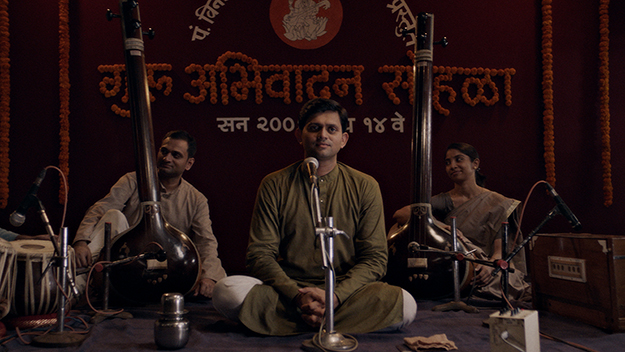Review: The Disciple
This article appeared in the June 3 edition of The Film Comment Letter, our free weekly newsletter featuring original film criticism and writing. Sign up for the Letter here.

The Disciple (Chaitanya Tamhane, 2020)
Much has been said of the universality of Chaitanya Tamhane’s The Disciple, linking its failed-musician protagonist and his forbidding mentors to Western films such as Inside Llewyn Davis and Whiplash. Nevertheless, despite traversing familiar paths, The Disciple has an opaqueness that feels quite slippery. The painstakingly detailed visual and cultural world rendered by Tamhane somehow feels intimate and inaccessible all at once. Such impenetrability is not merely because of the film’s chosen milieu, namely the world of Hindustani classical music in Mumbai. Instead, it is Michal Sobociński’s observational and minimalist cinematography that keeps the audience at bay, eschewing ready answers or maudlin resolutions to the film’s numerous moral, intellectual, and artistic quandaries.
The Disciple is told in a series of ellipses as it follows the toiling of singer Sharad Nerulkar (first-time actor and trained musician Aditya Modak) at different stages of his life. Sharad’s boyish awe for North Indian classical music deepens into a near-ascetic devotion in his twenties, as he undergoes rigorous training with his guru. In his day job, he digitizes cassettes and LPs, effectively manipulating the ephemerality of the performances he has seen in his younger days into enduring materiality. At night, he meditatively zips through the desolate streets of Mumbai, his mind subsumed by recorded lectures from Maai, an elusive Hindustani music genius and his late father’s inspiration. As Maai speaks of a musician’s arduous path to greatness—which includes endless practice, loneliness, and hunger—the image of Sharad on his motorbike mirrors that of a modern-day Don Quixote, chasing a mirage-like promise of truth made possible by virtuosity.
Fast-forward to his late thirties: the weight of Sharad’s unrealized ambitions hangs heavy on his soul and his physical self. The stirring fire we saw in the earlier chapters of his life is now reduced to embers that might soon turn to ashes. Unassured of his own artistic merit, Sharad finds himself at a tragic crossroads where he must decide to either loll along in mediocrity or simply give up, discarding his years of monastic commitment.
Out of the film’s many mesmerizing tableaux (which include scenes of transcendent performance), the scooter rides linger most powerfully in my mind. The cinematic language here has a rhythm that approximates music. The ambiguity of non-diegetic and diegetic sounds is particularly fascinating: a portion of the score carries over from one segment to another, becoming diegetic music in the next scene. In the early riding sequences, Maai’s lecture, voiced by the late Marathi filmmaker Sumitra Bhave, seemingly springs out of thin air, as Sharad is not wearing any headphones. The tremulous timbre of the woman’s voice, simultaneously otherworldly and guttural, preaches values that might appear at odds with urban excess. Yet as Maai’s voice completely replaces the bustling noises of the city, fluid long takes embed the texture of her teachings into the roads and facades of Mumbai, and into Sharad’s very corporeal core.
The recurring nature of these sequences also mimics the repetitions of vocal training, wherein a student practices the same raag or attempts the same modulation over and over, until it is muscle memory. Such repetitiveness speaks to the importance of recall in the oral teachings of Hindustani classical music: Sharad’s nightly rides bear the same significance as his daily music lessons and his yoga exercises. They’re a ritual of remembrance.
The omnipotence of Maai’s voice suddenly loses its sheen late in the film when a music critic reveals to Sharad that the guru used to harbor anti-Muslim sentiments. The supposed purity of musical training is abruptly called into question, and Sharad’s own pursuit, which is surrounded by TV news reports of violence against Muslims, now appears blinkered. When an older Sharad takes off his earphones while listening to Maai on his usual rides, the gesture is small, but the severing with traditional trappings is dramatic. Her voice is no longer in his head. Instead, Sharad stops on the side of the road and looks at massive billboards selling a perfume named “Vibe,” a word whose modern meaning is a bastardization of the rapturous sense of presence so central to the performance of Hindustani classical music. The advertisement recalls the singing-competition TV show Sharad had watched earlier in the film, its frivolity incomprehensible yet dazzling to him. The past is oppressive; the future is inconsequential. And so, the music stops.
The Disciple is available to stream on Netflix and screens at New York’s Paris Theater June 7-13.
Phuong Le is a Vietnamese film critic based in Paris. Her writing can be found in Sight & Sound, The Guardian,Total Film, and other publications.







